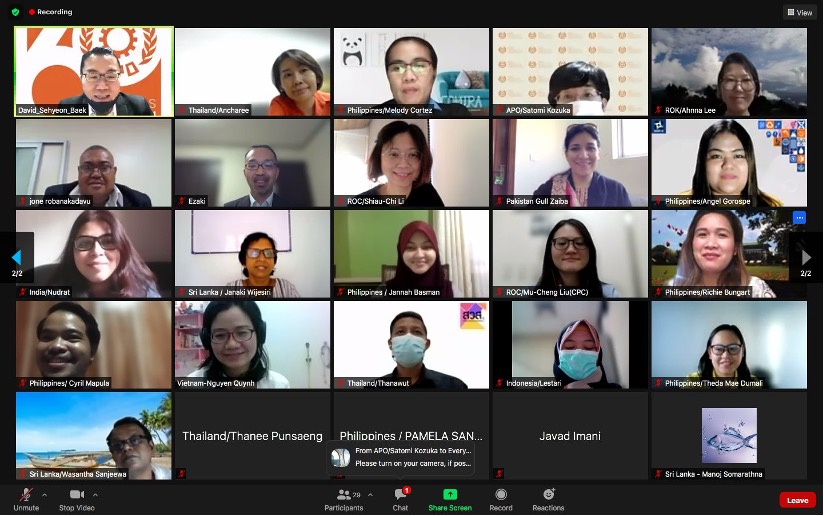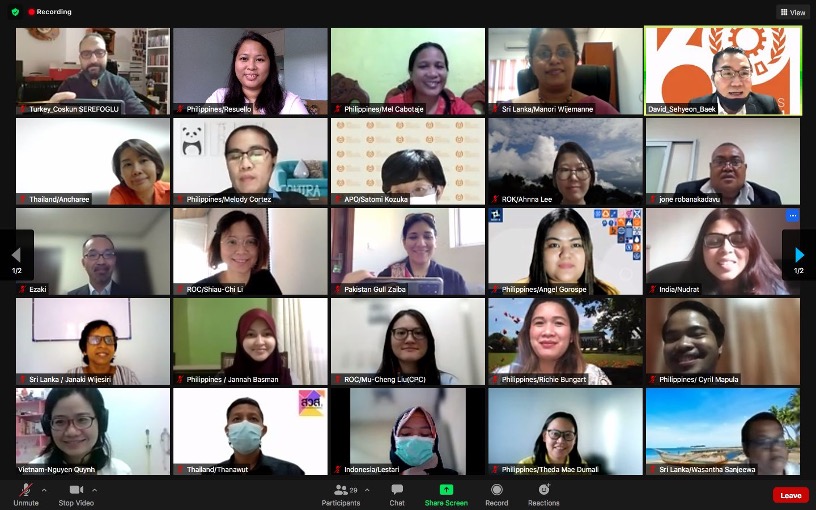
The Department of Science and Technology - Philippine Council for Agriculture, Aquatic and Natural Resources Research and Development (DOST-PCAARRD), through its Technology Transfer and Promotion Division (TTPD), participated in the Asian Productivity Organization (APO) Workshop on Nurturing Social Enterprise. The activity took place on December 6-8, 2021.
Participants of the three-day online workshop were from Cambodia, Fiji, India, Indonesia, Iran, Pakistan, China, South Korea, Sri Lanka, Thailand, Turkey, Vietnam, and the Philippines.
Recognizing the role of social entrepreneurs as catalysts for change by using market-driven strategies to tackle critical social issues, the APO workshop aimed to: 1) promote social enterprises and social innovation in the service industry; 2) understand key factors for developing social organizations; and 3) gain insight on current social issues, how to devise solutions, and how to measure the impact of social enterprises.
The said objectives were made possible by the invited experts particularly Dr. Chen-Wien Shen and Mr. Hideyuki Ezaki. Dr. Chen is from the National Central University in Taiwan and is an accredited advanced practitioner of social value and social return on investment (SROI) having a proven competence on social impact and social value assessment. He is also the Director of the Yunus Social Business Center. Meanwhile, Mr. Ezaki is the President of Management Assistance Co., Ltd. in Japan, which supports over 100 SMEs in terms of productivity improvement, overseas marketing, business and new service creation, among others. He also provides trainings and workshops on productivity and innovation creation.
The workshop was further enriched by the sharing of selected social entrepreneurs from Indonesia and Korea who presented their personal experiences in setting up their social enterprises, while imparting the learnings and challenges they met along the way.
Day 1 tackled the discussion of business models for social entrepreneurship; how a social enterprise sustains fisheries in Indonesia, and a social enterprise in Japan. Dr. Shen discussed the basics of social entrepreneurship and the business models for social enterprises. According to him, the three components of a social enterprise in its simplest form are problem identification, development of a social value proposition, and creation of a solution.
Ms. Utari Octavianty, General Director of PT Aruna Jaya Nuswantara Indonesia shared her experience in establishing Aruna. Aruna is a technology company focused on the marine/fisheries sector with a mission to improve the livelihoods and lives of Indonesian fishermen through technology innovation. Through Aruna, the inefficient supply chain was improved and layers of middle men were cut for better pricing and margin.
Mr. Ezaki on the other hand, talked about social enterprise in Japan such as human resource development in social business citing the Social Entrepreneur College Inc., (SEC) in Kyoto and the Social Innovation Laboratory Kyoto (SILK). Established in 2010, SEC is the first institution that aims to develop social entrepreneurship in Japan. SILK, on the other hand, is an industry-supporting organization that helps businesses in their efforts to bring social innovation in Kyoto.
Day 2, focused on sharing of Mr. Wan Song, CEO of Bookband Co., Ltd. in South Korea, on how he had set up his social enterprise in Rwanda, East Africa, which provided employment to the local people. Mr. Song is the man behind Rz MANNA Bakery and Café in Rwanda that was put up with the assistance from KOICA. He highlighted the importance of preliminary market research to map out people’s needs, existing competitors, and the significance of building a sincere relationship with the staff. On the other hand, Dr. Shen discussed how social enterprises can receive funding from diverse sources while exploring different organizational forms. In particular, he talked about grant funding, investment funding, crowdfunding, social impact bond, and impact investing. Mr. Ezaki shared how he had been helping a Japanese-owned paper recycling business based in Vietnam since its establishment – from idea creation, business designing, and business planning.

On Day 3, Dr. Shen talked about criticisms, challenges, and opportunities for social entrepreneurship. He said that many people are skeptical if social enterprises can really change the world because some social entrepreneurs are inexperienced and unaccountable, among others. For challenges, he mentioned dynamic environment, socio-economic dilemma, informal market set up, resource mobilization, organizational set up, and scalability dilemma as some of the concerns that need attention. But opportunities according to him also abound in terms of social welfare void, political logic, socio-market logic, and social assets and resources.
Meanwhile Ms. SungUn Chang, Founder and CEO of Yolk, presented her solar cow project in Africa, an innovative solar panel technology that has helped increase the attendance and enrolment of students, and has become a sustainable energy source. Solar cow charging systems are placed in schools to encourage parents to send their kids to class. Each student has portable batteries known as a “power milk” that can be charged while the students attend classes. While the project was originally conceptualized for Kenya, it has now expanded in Tanzania, and Congo serving 5,000 direct beneficiaries and 25,000 indirect beneficiaries. This innovation has already been awarded several prizes including the CES Innovation Award in 2019, Time Magazine’s Best Inventions Award for 2019, Top 3 during the GreenTech Festival in Germany, and the P4G Partnership Award, among many others.
On the other hand, Mr. Ezaki, discussed a case in Mexico and Japan offering two different funding schemes. The Pacific Financial Society (SOFIPA) in Mexico offers financial services to people in extreme poverty, while the Credi-impulso mujer is for women entrepreneurs who married at a young age and who need capital to start or expand their business. These young women are given a preference because early marriage has impeded them from continuing their education and developing their skills. The Japan Financial Corporation, a public corporation owned by the Japanese government, provides diverse services including “social business supporting funds.”
To wrap up all the discussions, the participants shared their learnings from the 3-day workshop and expressed their appreciation to the resource speakers and organizers. Moreover, the participants were encouraged to have open communication lines with each other for future possible collaborations and partnerships (Rubiriza DC. Resuello, DOST-PCAARRD S&T Media Services).
